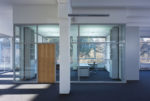During the pandemic, some skiers have been doing just that. But does the romantic vision tally with the reality?
It was in May, while hiking along the forest trails and waterfalls of La Tièche, with views towards the snow-dusted peaks of the Matterhorn and Mont Blanc, that fitness coach Jessica Z Christensen decided to spend more time in the Swiss mountains.
After a decade of being a digital nomad, the Italian and her Danish-German husband Lars set up the sport and co-working business Mavericks in the ski resort of Crans-Montana. “We felt so lucky to be there, in a year-round adventure playground, and asked ourselves, how can we make a life so we can do this all the time? We were meeting lots of international people who also love the outdoor lifestyle and don’t want to give it up,” she says.
The international regulars – a Swedish scientist, a French naturopath and a Czech start-up founder among them – are not alone in re-evaluating their life-work patterns during the pandemic. Depicted as perilous, powerful or exhilarating, the mountains have long fired the imagination, from the Romantic poets Shelley and Coleridge’s odes to Mont Blanc, to the American naturalist John Muir, who penned in 1873: “The mountains have been calling and I must go (& I will work on while I can).”
Fast forward to last winter, when locked down in Massachusetts, the writer and clinical psychologist Scott Haus described his longing for the lofty mountains around his Swiss second home: “I love the feeling of letting go, of surrendering. The passivity I feel when I am in them makes it more possible, ironically, for me to create, to write new things.”
Yet for all the romance of the vision, how does a 21st-century city dweller adjust to the unpredictability and realities of mountain life? Having a crash pad in the Alps for weekend escapes is one thing, but working and living there for extended periods brings a different approach. “People are now looking for a second home in the true sense of the word – which is less likely to be in the thick of the action, but a larger property on the quieter fringes of town,” says Alex Koch de Gooreynd of agent Knight Frank.
Upsizing
This means that some owners are upsizing their Alpine homes for easier homeworking. One woman, from Ireland, owns a two-bedroom apartment in the French resort of Les Gets with her wife but is upgrading to a five-bedroom chalet with two home offices. The former logging town has traditional Savoyard-style chalets and newer properties built to the stone and wood vernacular. “We desperately missed not being able to ski for 18 months and not being in the mountains,” says the 45-year-old, who works in media and prefers not to be named. “I realised what a waste of time it was flying to London for a meeting; and if we can work remotely – why not from here? The broadband is as good as at home and just being able to step out and look on to the snow will be a tonic.” Only once in 10 winters have they ever faced a snow-blocked road to the valley but they are now kitted up with winter tyres like the locals. She says Les Gets has a more authentic feel than purpose-built resorts such as Flaine – the 1960s Modernist village designed by the Bauhaus architect Marcel Breuer that skiers either love or hate. As a city dweller she was drawn to the rustic chalet style. “We love the friendliness of the town, though it’s not yet geared up for year-round living. The local supermarket closes in the autumn and spring when the town is a bit dead.” In time this might change as off-season demand increases – this has happened in Méribel and Courchevel.
Another indicator of the shift towards increased personal use is the decrease in French owners putting their property on the rental market, says Charles Antoine of agent Athena Advisers. There is a 20% VAT (value-added tax) rebate available for making a new-build property available for rent. The agency’s own records show those taking it up reduced from 57% in the 2018-19 winter season to 28% in 2020-21.
One north Londoner hopes to rent out her just-completed two-bedroom flat in Val d’Isère but she is dreaming of spending whole winters there when she isn’t working so much. That the resort (along with Tignes) is halfway through installing fibre-optic broadband will help with any remote working. “As a family we’ve been skiing year after year and I’ve always aspired to have a home in the mountains,” says the engineering designer, who prefers not to be named. She chose a high-altitude resort with climate change in mind – if lower slopes lose snow it will still offer skiing. “This is a place for my sons, and then their children.” The rub is that she will need to go out for a month, and then come back, in order to spend the whole winter in France – now that she is subject to the 90 days in every 180 limit for non-EU citizens.
Brexit effect, other limits
However, the UK’s exit from the EU has caused a British owner and his wife, who have spent 14 winters running a catered eight-bedroom ski chalet in the Mont Blanc valley, to reconsider. They had enjoyed the contrasts of their 50-50 life split between the London commuter belt and the empty wilderness of the Haute Savoie but now face difficulties recruiting British seasonal workers. “We can’t really run it now as we did without moving lock, stock and barrel to France, which we don’t want to do for tax reasons,” he says. “We might have to sell up and get a smaller holiday home. We ‘function’ when we are away from the mountains but truly ‘live’ when we return.”
Second-home owners from within and without the EU will need to keep their stays to less than 183 days to avoid becoming tax resident where their ski resort is located. However, buying a property is not quite so easy in Swiss and Austrian ski resorts, where second homes are tightly regulated. In Swiss resorts, the number of second homes is capped to 20% of a municipality’s housing stock, and strong domestic demand during the pandemic has pushed up prices.
In Verbier, favoured for its back-country skiing, there are thin pickings, says Florian Steiger of Swiss agent Steiger & Cie. Among the buyers seeking to upsize are people based in Geneva swapping their main base with their weekend home in the Valais, helped by the fact that 96% of the Swiss population enjoys 5G coverage. Verbier is now more easily accessible now the cable car up from Le Châble (on a train line to Geneva) opens until 11pm. Easy train access from Geneva was one reason that Texas-based asset manager Dominick Barto chose the nearby resort of Nendaz to buy a four-bedroom chalet in September as a second home. Vertical drops up to 7,000ft (2,134m) are doubly dramatic than those in the Colorado resorts closer to home, he says. “I love the fact you can ski on and on without stopping and the panoramic views around Nendaz remind me of Alaska.” It was a decision based both on Covid life-balance introspection and investment. “We didn’t want to put all our eggs into the US basket and it may even become a permanent residence. The children start school in four years – Swiss options are not bad.”
Education
In January, Copperfield International School, in Verbier’s Le Hameau, was opened by former Harrow and Sevenoaks School teacher Hugh McCormick. Offering teaching in small groups, it evolved from the model he set up in London in 2020 to support children during lockdown. “We were approached by a number of families keen to base themselves in Verbier, yet wanting a high-quality school offering the IB [International Baccalaureate],” he says. “We are reaching capacity with over 40 pupils and hope to offer boarding next year.” Annual fees go up to CHF40,000 ($43,000) for the final year yet he’s keen for it not to be perceived as a VIP school or just a “day care-plus” winter camp. 10% of pupils will be from the Le Châble area (where many local workers live) on assisted places and most families have committed long-term.
Many also already have chalets, such as Stuttgart-born Arne Zimmerman, who for the second winter will be taking his two daughters to school by snowmobile and running his Tribeca art gallery remotely. “The pandemic was the trigger for us to decamp [from New York] to our chalet,” he says. “We’ve skied North America but the girls loved the adventure of being in Verbier. Being here is a refreshing contrast to the competitive environment of New York, everyone is welcoming; respectful. It’s been the best
Admissions are going up by 35% a year at Le Régent International School in Crans-Montana, which has a new collaboration with Institut Le Rosey, the renowned boarding school. Of the 78 new students joining in September, the biggest contingents are from France, the UK, Italy, Japan and Mexico. Yet with the departure of some Asian families at the start of the pandemic, there is still room for new pupils. “The resort has become a more dynamic place to live, and the attractive lump-sum tax regime of the Valais also helps,” says Mathieu Lafond-Puyo, director of admissions.
Over the border
In the French Alps, new ways of working have continued to attract people to smaller villages, where year-round life is more firmly entrenched than in the big ski resorts and where their money goes further. “There’s been a real shift towards locations where second-home owners can stitch themselves into the local community rather than wanting to be near the ski lift,” says Andrew Beale of estate agent Free Spirit Alpine. “One recent buyer in a small village wanted a list of who his neighbours would be because he intends spending so much time there.” For their part, the locals – many of whom have an involvement in the tourism industry in these villages – welcome new arrivals keen to sensitively integrate into the community. They sell off old agricultural buildings they don’t use to those keen to renovate. In the village Beale mentions, Villarabout in the Three Valleys, renovated houses cost €10,000 (CHF10,500) per sq m, compared with about €14,500 in the nearby town of Saint-Martin-de-Belleville. Such classic villages of old slate-roofed stone houses with modern interiors are in demand.
Also close by is Les Allues, a popular village for British expats, where passionate skiers Robert and Charlotte Smith moved from east London in October 2020. Redundancy from his IT job pushed Robert towards his dream of being a ski instructor, a plan that was put on hold for the whole of last winter, but his training finally starts next month.
“We’ve always dreamt of splitting our life between the UK and Europe and we asked ourselves, where best to build a proper life?” says Charlotte, a freelance book editor. The couple bought a five-bedroom farmhouse that is close to a handful of restaurants, a source of fresh croissants and on a free bus route to the ski lift (Charlotte doesn’t drive). “We miss the diversity of the restaurants, being able to have dim sum one day and Sri Lankan the next, music gigs and galleries but the downsides of London life had begun to outweigh the benefits. I am looking out of the window at blue skies above incredible autumnal colours across the Bozel valley, instead of a block of flats back in Bow,” she says. “We came out to do a few weeks’ skiing but have discovered so much more to do. We’re not the only ones who came for the winter and stayed for the summer.”
Copyright The Financial Times Limited 2021
Full story here Are you the author? Previous post See more for Next postTags: Business,Featured,newsletter


















